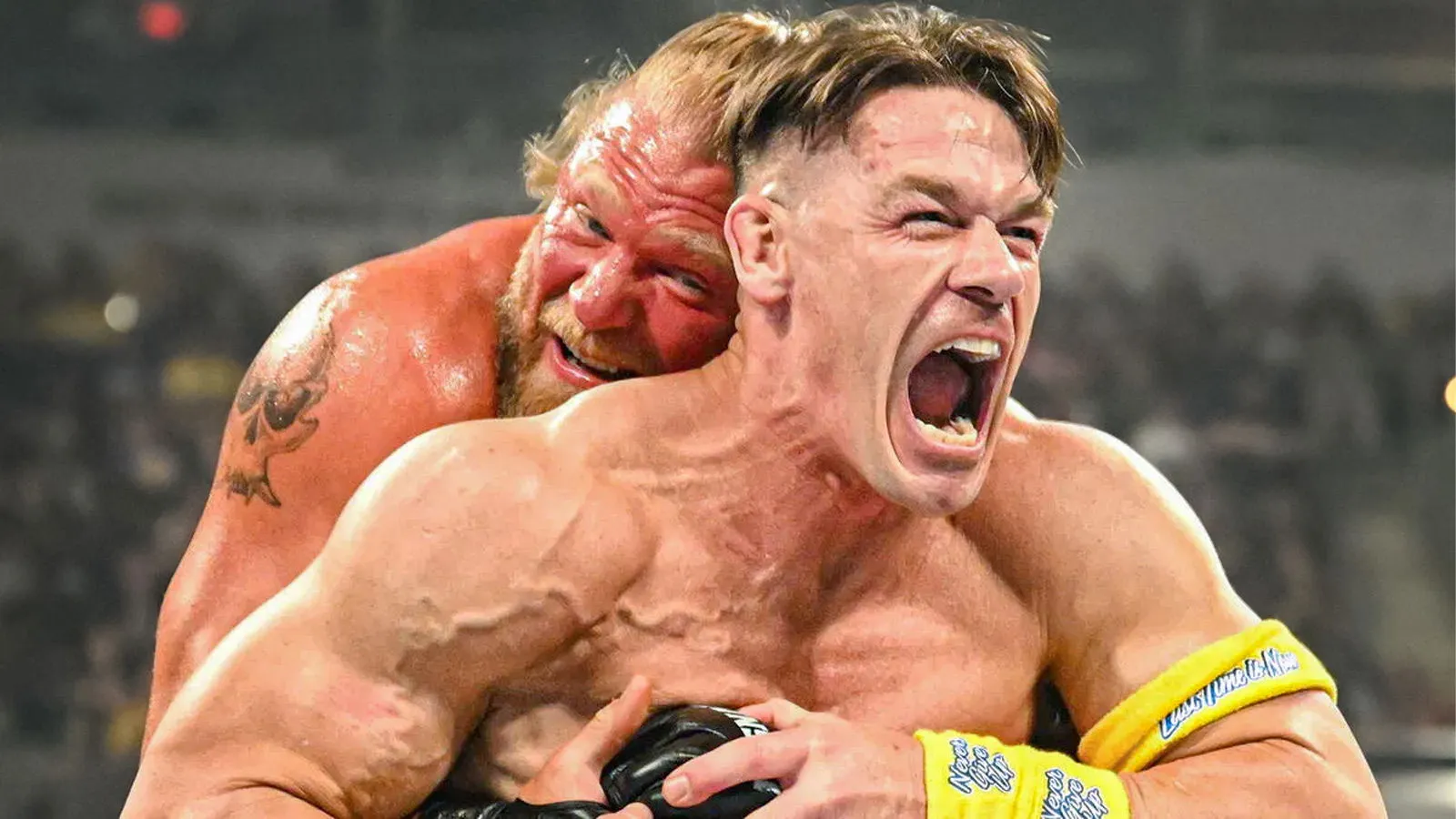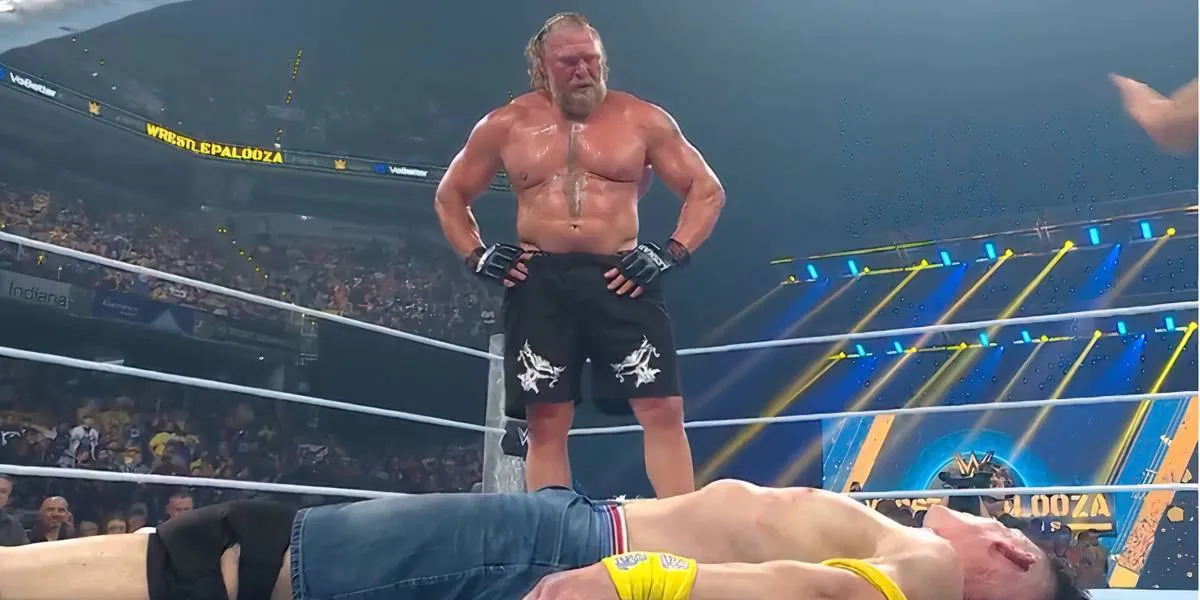

Shocking Truth: Why Did WWE Let Brock Lesnar ‘Crush’ John Cena At Wrestlepalooza?
Professional wrestling thrives on drama, spectacle, and moments that shock the audience to its core. Throughout WWE’s storied history, there have been countless instances where fans were left stunned, either cheering in excitement or questioning the creative choices behind the curtain. Among these jaw-dropping moments, one stands out as particularly polarizing: the night Brock Lesnar completely dismantled John Cena at Wrestlepalooza.
For many fans, this wasn’t just another storyline. It was a match that rewrote expectations, flipped the traditional narrative on its head, and raised important questions about WWE’s long-term strategy. Why would the company allow its biggest star, John Cena, to be crushed in such dominant fashion by Brock Lesnar? To truly understand this shocking decision, one must explore the characters involved, the business logic behind WWE, and the long-term storytelling vision.
The Aura of Brock Lesnar
To grasp the full weight of the decision, it’s important to examine Brock Lesnar’s unique presence in WWE. Known as “The Beast Incarnate,” Lesnar is unlike any other performer. His background as an NCAA wrestling champion, a former UFC Heavyweight Champion, and a physically intimidating figure made him stand out not just as a sports entertainer but as a legitimate combat athlete.
When Brock Lesnar returned to WWE, he brought with him an aura of authenticity. Fans knew that when Lesnar stepped into the ring, he wasn’t there to put on a flashy show—he was there to dominate. His suplex-heavy offense and raw aggression created a sense of danger that no other WWE superstar could replicate. Allowing him to demolish John Cena at Wrestlepalooza amplified that aura, reinforcing the idea that Lesnar wasn’t just another wrestler but a once-in-a-generation phenomenon.
John Cena’s Established Legacy
On the other side of this shocking clash stood John Cena, the face of WWE for more than a decade. Cena was a 16-time world champion, a figure who had carried the company through some of its most turbulent eras. Beloved by many and criticized by others, Cena had become synonymous with resilience. His catchphrase “Never Give Up” embodied his persona and inspired millions of fans.
So when Cena faced Brock Lesnar, many assumed it would be another classic battle where Cena would endure punishment, rally back, and ultimately stand tall. Instead, fans witnessed the complete opposite: Cena was overwhelmed, tossed around, and ultimately crushed in a way no one anticipated. This wasn’t just a loss—it was a statement defeat that sent shockwaves across the wrestling world.

Why Did WWE Make This Decision?
At first glance, the outcome seemed bizarre. Why would WWE deliberately weaken its biggest star in front of such a massive audience? The truth lies in a blend of business strategy, creative direction, and the need for long-term storytelling.
The first factor revolves around creating legitimacy. Brock Lesnar had already cemented himself as a major attraction, but by allowing him to decisively destroy Cena, WWE elevated him to a level beyond the roster. He became the ultimate obstacle—an unbeatable force who required extraordinary effort to defeat. This kind of dominant portrayal made Lesnar more than just a heel; it made him a monster attraction that people paid to see.
Secondly, WWE understood the importance of building new narratives. Cena’s character was already unshakable in terms of fan recognition. Even in defeat, Cena would remain beloved, as his legacy could withstand such a crushing loss. Lesnar, on the other hand, needed this dominant win to solidify his role as the ultimate villain in WWE’s storytelling.
The Psychological Impact on Fans
The spectacle of Brock Lesnar crushing John Cena wasn’t just about one superstar defeating another. It was about shocking the audience to their core. For years, WWE had built Cena as the resilient hero who never gave up. To see him torn apart so completely left fans with a rare sense of vulnerability.
This psychological shift was crucial. Suddenly, the unbeatable Cena was humanized. Fans were forced to question whether their hero could actually overcome this kind of destruction. It injected uncertainty into WWE programming—a quality that is often missing when outcomes feel predictable. That uncertainty kept fans tuning in, eager to see how Cena would respond and whether anyone could stop Lesnar’s reign of terror.
Business Motivations Behind the Match
Beyond the storytelling perspective, WWE’s decision carried significant business motivations. At its core, WWE is not just about athletic competition—it’s about drawing audiences, selling tickets, and creating moments that spark mainstream attention.
By letting Brock Lesnar dominate Cena, WWE generated headlines beyond the wrestling community. News outlets, sports media, and casual fans all took notice of the shocking result. This level of attention translated into higher ratings, increased pay-per-view buys, and long-term interest in upcoming storylines.
Moreover, WWE needed a fresh dynamic in its main event scene. Cena had been on top for years, but fans were growing restless with the predictability of his victories. By reshuffling the deck and letting Lesnar reign supreme, WWE reinvigorated the product and set the stage for new stars to emerge.
Long-Term Storytelling Payoff
While the short-term shock value was undeniable, the long-term payoff was equally important. WWE’s decision positioned Lesnar as an unstoppable force, which in turn created opportunities for other wrestlers to rise. Any superstar who could eventually conquer Lesnar would instantly gain credibility and fan support.
This was not just about Cena losing—it was about WWE building a future where defeating Lesnar would mean something monumental. The crushing of Cena at Wrestlepalooza became a cornerstone of Lesnar’s larger narrative arc, one that would shape rivalries for years to come.

Lessons Learned from the Decision
The shocking outcome of Brock Lesnar vs. John Cena serves as a reminder of how WWE balances entertainment, storytelling, and business strategy. It showed that sometimes, even the most beloved hero must fall to create fresh intrigue. It highlighted the importance of unpredictability in wrestling—a factor that keeps fans engaged and emotionally invested.
It also reinforced the idea that wrestling is not just about wins and losses but about the stories those results tell. Cena’s crushing defeat didn’t damage his career—it added depth to his character. Lesnar’s victory didn’t just elevate him—it reshaped the entire WWE landscape.
Conclusion
The night Brock Lesnar crushed John Cena at Wrestlepalooza will forever be remembered as one of WWE’s boldest creative choices. It shocked fans, sparked debates, and reshaped the narrative direction of the company. Behind the spectacle was a carefully calculated decision that balanced star power, long-term storytelling, and business growth.
In the end, WWE achieved its goal: creating a moment that people still talk about years later. Whether you loved it or hated it, the shocking truth remains clear—this was not just about one superstar defeating another. It was about redefining what fans thought they knew, reminding everyone that in the world of WWE, anything can happen.


















